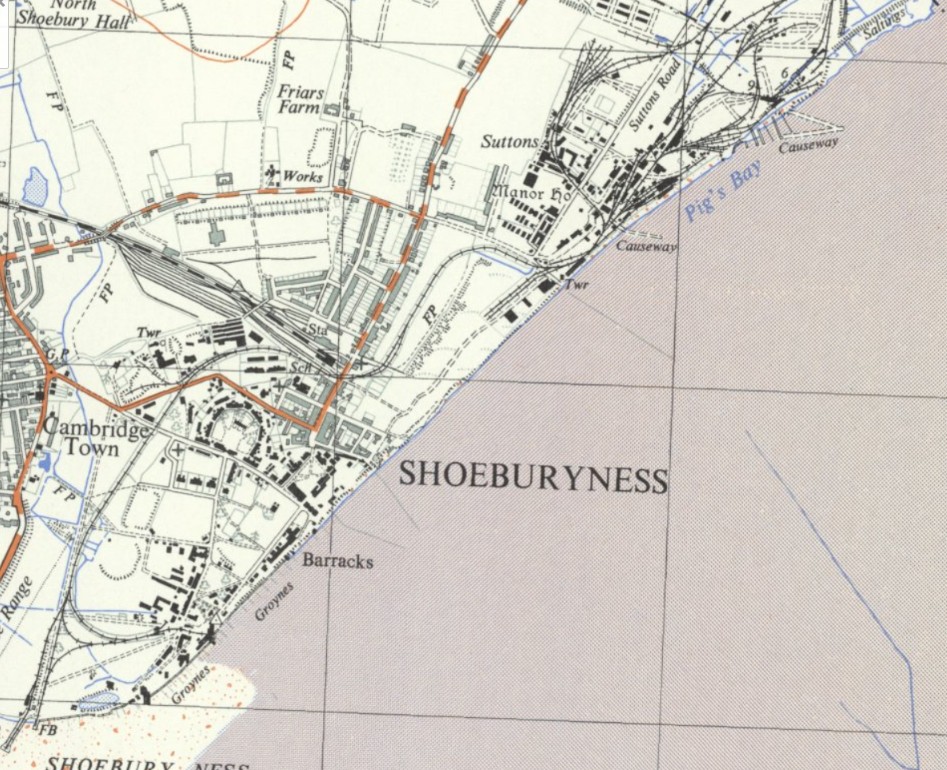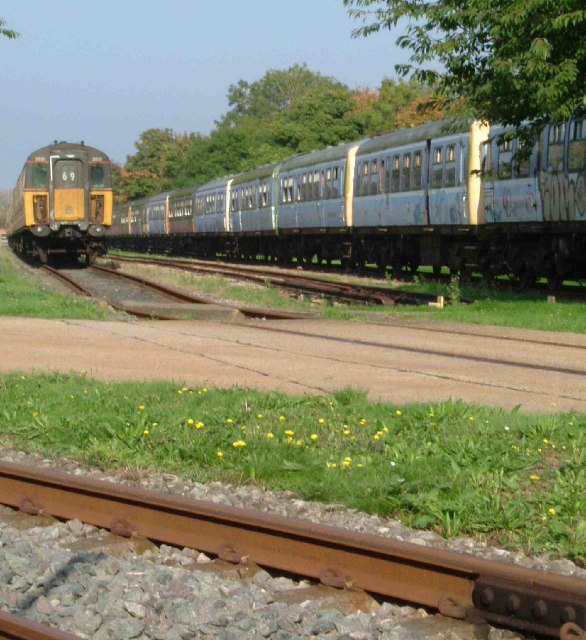
To subscribe to the email, please send a blank email to: raildate+subscribe@groups.io
Raildate is a collaboration between the editor and a number of contributors. Please think about supplying links that you spot. The contact email address is: raildate.co.uk@gmail.com
There are sections on:
East Midlands
Midlands
North East
North West
Northern Ireland
Scotland
South East
Yorkshire
Europe
Bus
Marine
Thank you to this week's contributors.

A coastal town with an extensive private railway network. Electric trains depart from here every 15 minutes or so. Although the map is from the 1950s, most of the private network is still in use. Where is it?
Answer: Shoeburyness. The map had been rotated 180°, otherwise too easy! Congratulations are due to the following for their correct answers: Colin Penfold, Dave Goodyear, Simon Wass, Andrew Treves, Richard Lingard, Paul Hopper, John Lacy, Steve Beck, Chris Neale, Ian Lowe, Neil Kearns, Jim Allwood, Tom Burnham, Paul Tambini, Bryn Pitcher, Bill Jagger, John Musselwhite, Alan Twinam, Neil Spencer.
The private network is military and originally stretched onto Foulness Island. The site dates from before the Crimean War (1854), and has been used throughout as a gunnery range. More recently, it has been used for the 'proper' disposal of munitions, and not the deep-sea dumping of yore. Qinetiq now runs the site as a test centre and the ranges are still operational. Redundant railway vehicles are often used for target practice, sometimes ex-tube stock, otherwise mainline vehicles as shown below.

Image credit: Glyn Baker
Some photos of Class 66 66164 crossing Shoeburyness High Street into the Qinetiq site are available in this Flikr album by John Lidstone.
Your Editor has made the decision to suspend producing the weekly Raildate newsletter. If someone wishes to take over the preparation of future updates, I will happily support them with a handover. The Raildate archive will remain online and the email address open.
I took over Raildate from founding editor Howard Sprenger three years ago (2022) with ambitious plans to develop the content and, it was hoped, increase the subscriber base into the thousands. It depended on being able to access services such as YouTube, TV listings, etc, and automating their cataloguing.
Every enterprise - voluntary or commercial - should have something unique about it to ensure that new users are attracted. As a digest of the week's news, Raildate has its place but the weekly email is falling behind what algorithms can do, and needs other features to build upon. Circumstances keep changing and some ideas have not borne fruit. Starting with automated TV listings, the solution worked for six months until the source data changed requiring a major rewrite. More recently, Google withdrew access to the underlying YouTube bulk metadata.
Subscriber numbers have remained stable throughout, and responses to the Weekly Poser have been growing. I enjoy the research involved in preparing the Posers and have learned a good deal along the way. A recent consultation with c.80 of the most active subscribers and contributors yielded a response of about 30%. A large proportion are not active users of smartphones and social media, and find the curated news valuable, and a handful are ex-pats who appreciate the UK links. The Weekly Poser is undoubtedly a popular addition. One person mentioned missing the TV listings.
It is obviously disappointing to let down regular subscribers. But I am brim-full of ideas for other projects, not all about transport, and need more time to focus on finding those with the potential to grow. For instance, my other sites include Timetable World - relaunched in 2020 as a Lockdown project and now attracting a global audience - and the RCTS Digital Archive [2023], the Society's second-biggest source of income after memberships. The IT technical challenge of making complicated things work (and look simple) is what I enjoy.
I’d like to thank everyone for their support and engagement during my brief time as editor, particularly the regular contributors without whom none of this would have been possible. Let’s hope someone will take it on and the loss of service will be brief.
We welcome links to publicly available online news items and videos from anywhere in the world. Despite its name, Raildate covers all transport modes, including also bus, tram, air, and marine.
Raildate may be freely distributed without permission as long as no changes whatsoever are made to the original document distributed by the Editor.
The main Raildate website https://raildate.co.uk includes a history of Raildate by the founding editor Howard Sprenger and archived editions from 1996 to the present.
Facebook members are encouraged to join the Raildate group.
© Matthew Shaw 2025